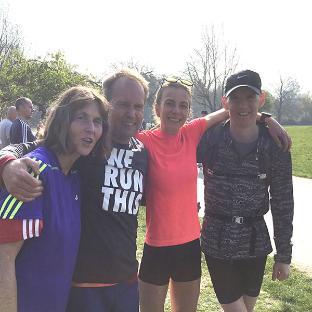Overcoming the urge to slow down!!!
By Andy Lane, Professor of Sports Psychology, Institute of Human Sciences, University of Wolverhampton.

London Marathon, 28th April 2019!
Anyone who saw Hayley Carruthers finish in the impressive time of 2 hours 33 mins, 55 seconds, stumbling over the link in clear pain would struggle to be impressed by her determination and resilience.
Running a marathon is tough for anyone; 26.2 miles is a long way, and an intense experience when running with a view to achieve a certain time or position.
Over the past year, Hayley has been coached by University of Wolverhampton doctoral student Dan Robinson under the supervision of Prof Andy Lane, Dr Ross Cloak, with London Marathon guru Dr Martin Yelling offering support. A key part of the research undertaken by this group is to develop mental skills to resist the urge to slow down. A marathon offers a lot of opportunities to test these skills. Hayley has trained at the University sports facilities undergoing conditioning training with Rhys Lincoln. Hayley also, recently, spoke at a University event.
Our work has focused on staying in the ‘here and now’ on focusing on the process of running. It is about being mindful of how the experience feels and learning to develop a relationship with sensations of fatigue. The urge to slow down, stop or even consider stopping altogether is entirely normal. We find that accepting the fact the event is tough but having a sense that you can overcome the challenge, can lead to not only a more enjoyable race but also a better performance. The inner voice telling you increasingly loudly to slow down or stop is familiar to most endurance athletes. It sets out to convince you that you can’t reach the end of your event or training session at the current pace. The first thing to realise about this voice however, is that it lies to you! We have all seen people, apparently exhausted, suddenly see the finish line and raise a fantastic sprint finish. This would not be possible if they were truly as physically exhausted as they have been telling themselves for the past number of miles.
This of course does not mean that we can all simply sprint the entire distance of a marathon and ignore the signals of distress which our body will rapidly create. There is a certain point at which the voice will become irresistible. Instead what we are seeking to do is operate in a sweet spot where the voice is there, but after a period of adjustment we find ourselves able to cope with it. Rather than attaching negative words to these feelings we can know that we are working well and appropriately for the event.
Confidence will increase as we realise that we are giving a tremendous effort towards our goal and that we are proving that we can go harder than our inner pessimist would like to suggest.
Like every aspect of endurance sport this ability can be improved with training. Training at a high intensity (for the distance) for extended periods not only provides obvious physical benefits but affords the opportunity to engage with the urge to stop and tune in to the volume of that voice which is sustainable. Feelings of discomfort trigger this voice, but experience will reduce the fear factor. Training and preparation give us all the tools we need to embrace the voice when it arrives, and competing with that voice in our ear is ultimately much more satisfying when the finish line comes.
Tips for embracing the urge to stop
- Re-frame feelings of discomfort as appropriate to the challenge you have chosen. You want it to be tough and these sensations are just evidence that you are working at the right level.
- Training at race pace intensities not only improves fitness but allows us to practice strategies to prove that it is possible to continue when we feel an urge to slow.
- Take confidence from reaching short term targets after your mind starts to protest. When it tells you can’t maintain the pace, focus on doing so for 60s or until the next landmark – you have already proved it wrong!
We have produced videos to help people improve their mental game.
And are part of a British Psychological Funding Project on the same topic.
For more information please contact the Corporate Communications Team.


/prod01/wlvacuk/media/departments/digital-content-and-communications/images-2024/240328-Varsity-Line-Up-Resized.jpg)
/prod01/wlvacuk/media/departments/digital-content-and-communications/images-18-19/220325-Engineers_teach_thumbail.jpg)
/prod01/wlvacuk/media/departments/digital-content-and-communications/images-2024/240404-Digital-Humanities-Training-Resized.jpg)
/prod01/wlvacuk/media/departments/digital-content-and-communications/images-2024/240320-Uzbekistan-Resized.jpg)
/prod01/wlvacuk/media/departments/digital-content-and-communications/images-2024/240229-The-Link-Resized.jpg)
/prod01/wlvacuk/media/departments/digital-content-and-communications/images-2024/240404-Pharmacy-Students-Resized.jpg)